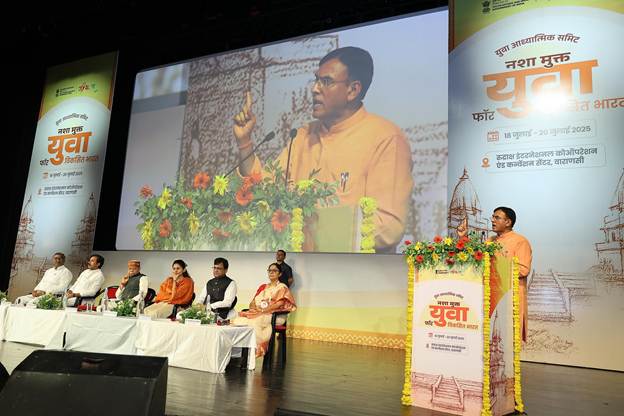Kashi Declaration for Drug-Free India Adopted at Youth Spiritual Summit in Varanasi

IN NEWS: Kashi Declaration for Drug-Free India Adopted at Youth Spiritual Summit in Varanasi
Analysis
- Event Overview:
- The Youth Spiritual Summit concluded in Varanasi at the Rudraksh International Convention Centre, marking the adoption of the Kashi Declaration for Drug-Free India.
- The summit was organised by the Ministry of Youth Affairs and Sports under the theme “Nasha Mukt Yuva for Viksit Bharat.”
- Over 600 youth leaders from 120+ spiritual and socio-cultural organisations, alongside academicians and officials, participated in shaping the declaration.
- Purpose and Vision:
- The Kashi Declaration aims to launch a nationwide youth-led movement against drug abuse, combining spiritual strength with social responsibility.
- It envisions a drug-free India by 2047, aligning with the national development goal of Viksit Bharat @2047.
- Core Recommendations of the Declaration:
- Treat substance abuse as both a public health and social issue.
- Advocate a whole-of-government and whole-of-society approach.
- Establish a Joint National Committee for inter-ministerial coordination.
- Introduce annual progress reporting and a national platform for connecting affected individuals with rehabilitation support.
- Integrate spiritual, educational, cultural, and technological interventions for preventive and curative action.
- Leadership and Key Messages:
- Dr. Mansukh Mandaviya, Union Minister for Youth Affairs and Sports, described the declaration as a “collective Sankalp (resolve)” — not just a document, but a commitment to transformation.
- He highlighted the role of spiritual institutions as the “backbone of the Maha Abhiyan” for a drug-free India.
- Governor Shiv Pratap Shukla emphasised that Kashi, as the “cradle of Sanatan Chetna,” must inspire moral and disciplined youth to safeguard the nation’s future.
- Participation and Institutional Role:
- The event saw participation from key ministers, including Dr. Virendra Kumar, Gajendra Singh Shekhawat, Anil Rajbhar, Nityanand Rai, and Raksha Nikhil Khadse.
- The summit reaffirmed the MY Bharat (Mera Yuva Bharat) framework, enabling youth clubs and volunteers to spearhead awareness and pledge campaigns.
- The Viksit Bharat Young Leaders Dialogue 2026 will review the progress of the declaration.
- Strategic and Social Significance:
- The declaration integrates spiritual consciousness into the fight against addiction, recognising India’s civilisational values as tools for social reform.
- It aims to combine policy, prevention, and participation to transform India’s youth into agents of national well-being.
Static Part (For UPSC Context)
- Kashi (Varanasi): One of India’s oldest continuously inhabited cities, considered a spiritual and cultural capital symbolising Sanatan Dharma and moral consciousness.
- Nasha Mukt Bharat Abhiyan: A flagship initiative by the Ministry of Social Justice and Empowerment, targeting awareness, counselling, and rehabilitation through district-level networks.
- MY Bharat (Mera Yuva Bharat): A platform launched to institutionalise youth engagement, leadership, and community-driven nation-building.
- Viksit Bharat @2047: A long-term vision aligning national policies towards achieving a developed India by 2047, the centenary of independence.
- Whole-of-Society Approach: A governance model that combines efforts of government, civil society, academia, and religious/spiritual organisations to address multidimensional issues.
Updated – 21 Jul 2025 ; 11:15 AM | DD News